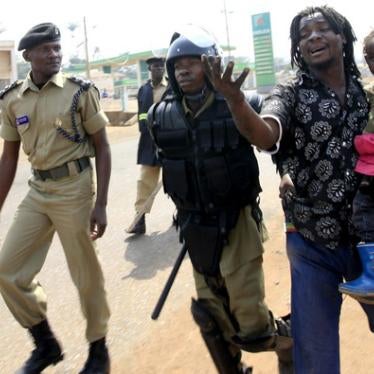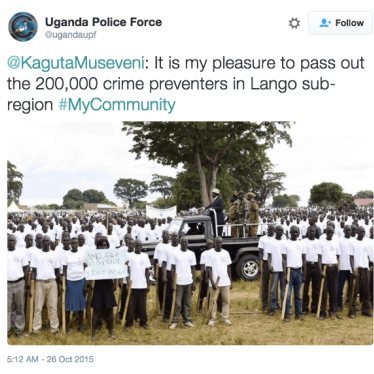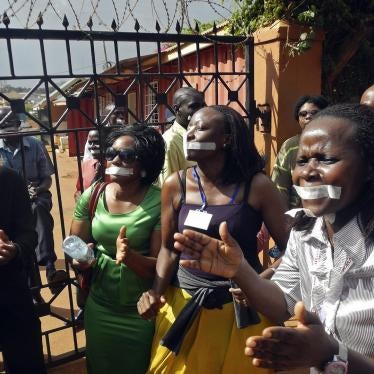Last Saturday, Ugandan police attempted – yet again – to stop opposition activists and candidates from speaking to potential voters. Television cameras filmed as police arrested a female activist in Rukungiri, western Uganda, stripping her naked, before tossing her into a police truck.
This violent arrest sparked widespread condemnation. Twitter ignited, and the hashtag #SomeoneTellKayihura, a reference to the inspector general of police, trended across the region and as far as South Africa. The Uganda Law Society, religious leaders, and women’s rights groups all spoke out to demand an end to police brutality. Police argue that the gathering was unlawful and the arrests were warranted. They have alternately blamed the woman for “stripping herself” and blamed the media for doctoring the videos. There is no evidence to support either allegation.
Uganda will hold presidential and parliamentary elections in February 2016. By that time, President Yoweri Museveni will have been in power for exactly 30 years. Many believe Museveni is increasingly concerned about a loss of control since one of his closest allies who is also a former prime minister, Amama Mbabazi, broke away to run against him a few months ago.
Ugandan police’s handling of public order management has been a source of serious human rights violations over recent years. The opposition’s ability to communicate with voters, particularly outside the capital Kampala, is precarious. They risk beatings, arrest, or worse. In September, police teargassed those gathered to hear Mbabazi at a rally in Jinja. Canisters fell into a school yard, leaving children crying for help. Police have also used live ammunition to disperse people at several opposition gatherings as well as rallies and demonstrations against government actions in 2009 and 2011, leading to numerous fatalities of bystanders and protesters.
Ugandan police brutality has played out countless times, often before television cameras. While there has been plenty of condemnation, ultimately nothing changes. The sad truth is that this is not about a poorly trained police force. Uganda’s police are highly trained, including in public order management. After the 2009 killings, the United Kingdom and Ireland both poured money into ensuring police had the requisite skills.
Uganda’s police brutality consistently favors the incumbent. Calls for investigations go nowhere because the brutality is the objective. It ensures voters cannot easily attend opposition gatherings. Ultimately, until Ugandans can freely assemble, hear divergent views, and weigh how to use their vote without fear of teargas, bullets, and batons, the freedom and fairness of Uganda’s elections will be in question.







